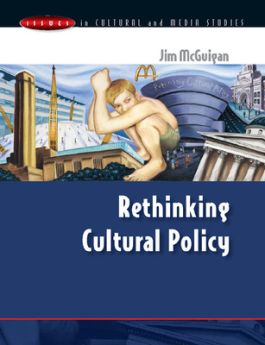Rethinking Cultural Policy
1st Edition
0335226426
·
9780335226429
© 2004 | Published: March 16, 2004
“a fascinating, thorough and expertly argued discussion of the modes and practices of cultural policy in an increasingly globalized and neoliberal world.”European Journal of CommunicationRethinking Cultural Policy addresses issues concerning cult…
Read More
Request More Info
After you purchase your eBook, you will need to download VitalSource Bookshelf, a free app or desktop version here. Then login or create an account and enter the code from your order confirmation email to access your eBook.
- Access the eBook anytime, anywhere: online or offline
- Create notes, flashcards and make annotations while you study
- Full searchable content: quickly find the answers you are looking for
Series Editor's Foreword
Acknowledgements
Introduction
1. Cultural Analysis, Technology and Power
2. Discourses of Cultural Policy
3. Cultural Policy Proper
4. Cultural Policy Proper and as Display
5. Rhetorics of Development, Diversity and Tourism
6. Culture, Capitalism and Critique
Glossary
References
Index
“a fascinating, thorough and expertly argued discussion of the modes and practices of cultural policy in an increasingly globalized and neoliberal world.”
European Journal of Communication
Rethinking Cultural Policy addresses issues concerning culture, economy and power in the age of new-liberal globalization. It examines how public cultural policies have been rationalized in the past and how they are being rethought. Arguing that the study of culture and policy should not be confined to prevailing governmental agendas, the book offers a distinctive and independent analysis of cultural policy.
European Journal of Communication
Rethinking Cultural Policy addresses issues concerning culture, economy and power in the age of new-liberal globalization. It examines how public cultural policies have been rationalized in the past and how they are being rethought. Arguing that the study of culture and policy should not be confined to prevailing governmental agendas, the book offers a distinctive and independent analysis of cultural policy.
The book examines a wide range of issues in cultural policy and blends a close reading of key theories with case studies. Topics covered include:
- Branding culture and exploitation
- The state, market and civil society
- How visitor attractions such as London's Millennium Dome are used for national aggrandizement and corporate business purposes
- Cultural development, diversity and ecological tourism in poorer parts of the world
Student friendly
Case examples within an international context.
Jim McGuigan has a very strong track record and excellent reputation as a previous author in this field.

